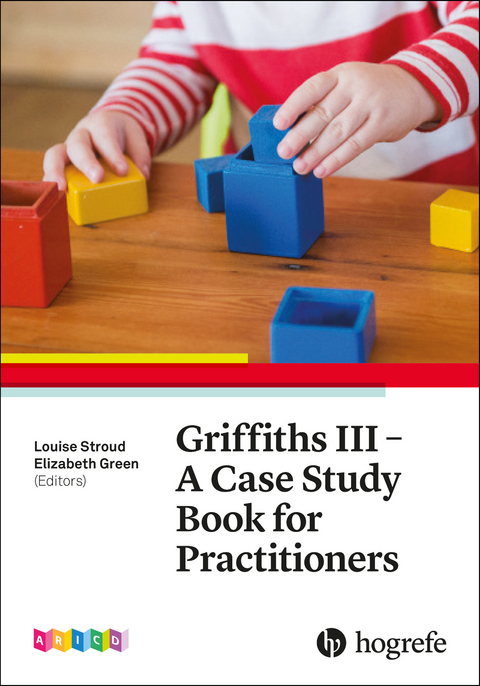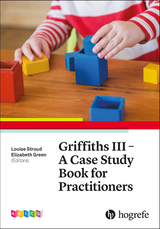Griffiths III
Hogrefe Publishing (Verlag)
978-0-88937-591-8 (ISBN)
Make full use of the Griffiths III with this detailed case study book
* Written by leading practitioners
* Introduces the psychometric properties
* Details how to use the test
* Outlines case studies for children with different abilities from 10 different countries
* Includes summaries and chapter review questions
* Color sections and illustrations
Written by world renowned practitioners of the Griffiths Scales of Child Development, Third Edition (Griffiths III), this volume presents individual case studies to assist practitioners and trainees in making full use the Griffiths III to comprehensively assess a child's development. Practitioners will learn about tracking and monitoring development and how to measure the impact of intervention - creating more informed decisions about the management and placement of the child.
Two introductory chapters examine the Griffiths III as a child development assessment tool, looking in detail at its psychometric properties and how to use the test to interpret, plan, and understand a child's performance as well as the child's strengths and challenges. Grouped according to five color zones for ease of reading, 15 case studies are presented for children with a wide range of abilities and from 10 different countries. The book is based on four conceptual frameworks: the ICF-CY, ESSENCE, the link between function and intervention, and Ruth Griffith's Avenues of Learning theory. Throughout the examples, the perspective of the child is placed at the center and their voices are included in the plans described. Key concepts, points of importance, and questions for the reader are included at the end of each chapter.
The book is aimed at practitioners of the Griffiths III, but it is also of interest to a wider range of developmental practitioners, including child psychologists, child psychiatrists, pediatricians, and child psychotherapists.
Louise Stroud, PhD, is a registered clinical psychologist and full professor employed in the Department of Psychology of the Faculty of Health Sciences at the Nelson Mandela University in Port Elizabeth, South Africa. She is also the lead researcher for the Association for Research in Infant and Child Development (ARICD, https://www.aricd. ac.uk/) based in Manchester, UK. Her specific research interests include the study of the psychology of people and their lives, the development of children, neuropsychology, and ecopsychology. Elizabeth Green, MD, is a retired developmental pediatrician, former consultant in pediatric rehabilitation at Chailey Heritage Clinical Services, former medical director of South Downs Health NHS Trust in Brighton, and past president of ARICD. She currently holds the research chair and is a trustee of ARICD. She is also a trustee of the Chailey Heritage Foundation and research associate at the Psychology Department at the Nelson Mandela University in South Africa.
About the Editors
Foreword
Preface
Section I: Introduction
Chapter 1: An Introduction to the Griffiths III Case Study Book
Section II: Griffiths III - A Child Development Assessment Tool
Chapter 2: Understanding the Griffiths III Test Properties to Understand
a Child's Performance
Chapter 3: Using Griffiths III to Interpret, Plan, and Report a Child's
Needs
Section III: Griffiths III Case Studies
Zone 1: Children With Symptoms of Learning, Physical, or Sensing
Difficulties
Chapter 4: Divoc: School Readiness in a Child With Developmental
Language Disorder
Chapter 5: Mary: Nonstandardized Use of Griffiths III as a Qualitative
Assessment of a Child Over 6 Years
Chapter 6: Poppy: A Child With Hearing Impairment and Congenital
Cytomegalovirus Infection
Zone 2: Children With Dominant Symptoms of the Autistic Spectrum
Chapter 7: Hugo: A Brazilian Child Diagnosed With Autism Spectrum
Disorder
Chapter 8: Jamie: Assessing a Child With High Functioning Autism
Chapter 9: Eli: Assessing a Child With Low Functioning Autism
Chapter 10: Victor: Resilience in the COVID-19 Pandemic
Zone 3: Children With Symptoms of General Developmental Delay
Chapter 11: Johan: A Swedish Boy Who Fits the ESSENCE Description
Chapter 12: Sam: Neurodevelopmental Concerns in a Preterm Infant
Zone 4: Children With Syndromes or Genetic Disorders
Chapter 13: Elena: Assessing a Child With Down Syndrome
Chapter 14: Ben: A Boy With a Mosaic Form of Chromosome 18q21.1
Deletion
Chapter 15: Milly: A Child With Fetal Alcohol Spectrum Disorder
Chapter 16: Ava: A Girl With Phenylketonuria and Typical
Development
Zone 5: Children With Variability in Typical Development
Chapter 17: Leo: A Child With Variability Above the Range of Typical
Development
Chapter 18: James: A Child With Variability Within the Range of
Typical Development
Section IV: Best Practice Strategies and Griffiths III
Chapter 19: Griffiths III Best Practice Strategies Emerging From the
Cases Presented
Chapter 20: A Final Word
Appendix
| Erscheinungsdatum | 12.08.2022 |
|---|---|
| Verlagsort | Toronto |
| Sprache | englisch |
| Maße | 177 x 254 mm |
| Themenwelt | Geisteswissenschaften ► Psychologie ► Entwicklungspsychologie |
| Geisteswissenschaften ► Psychologie ► Pädagogische Psychologie | |
| Medizin / Pharmazie ► Medizinische Fachgebiete ► Pädiatrie | |
| ISBN-10 | 0-88937-591-7 / 0889375917 |
| ISBN-13 | 978-0-88937-591-8 / 9780889375918 |
| Zustand | Neuware |
| Haben Sie eine Frage zum Produkt? |
aus dem Bereich




